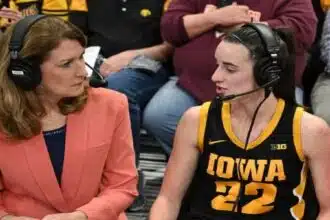In the world of sports, competition, passion, and exhilaration come together to create an arena where the extraordinary unfolds. But beyond the exhilarating victories and heart-wrenching defeats lies a realm of intrigue and fascination—the realm of sports gossip. Sports gossip has become an undeniable part of the sports landscape, from locker-room whispers to media-fueled controversies. This article dives deep into the fascinating world of sports gossip, exploring its origins, its impact on athletes, teams, and fans, and the ever-evolving role of social media in shaping the narrative.
The Origins of Sports Gossip
Gossip in the realm of sports is not a recent phenomenon. It has been a part of the sports world for as long as athletes have competed. In the early days, the grapevine consisted of conversations among fans at local taverns and in newspapers. Word of mouth traveled slowly, and gossip often remained confined to small circles.
However, as sports grew in popularity, so did the appetite for gossip. Athletes, with their hero-like status, became the subject of fascination for fans. Their personal lives, relationships, and off-field activities became as intriguing as their performance on the field. Newspapers and tabloids began to capitalize on this curiosity, fueling the gossip mill and taking it mainstream.
The Power of Fans in Fueling Sports Gossip
Fans play a significant role in the gossip mill. They often unearth clues, decipher cryptic posts, and speculate about the goings-on in the sports world. Fan forums, social media groups, and dedicated websites provide a platform for fans to discuss and dissect every aspect of their favorite teams and players.
While fan engagement is a testament to the passion and dedication of sports enthusiasts, it can also contribute to the spread of gossip. In the viral trends and memes era, a single tweet or post can quickly snowball into a widespread rumor.
The Impact of Sports Gossip on Athletes and Teams
Sports gossip can profoundly impact the athletes and teams it targets. At its best, it can generate interest and excitement, adding an extra layer of drama to the games. Some well-placed speculation or gossip can keep fans engaged and boost viewership. For instance, rumors about a star player’s potential transfer to another team can create buzz and anticipation, benefiting the player and the league.
However, the flip side of this coin is the detrimental effect that unchecked gossip can have. Athletes often face invasive scrutiny of their personal lives, which can be emotionally taxing and intrusive. False or exaggerated rumors can tarnish reputations, damage team morale, and affect an athlete’s performance on the field. In extreme cases, it can even lead to mental health issues.
Moreover, gossip can create unnecessary distractions for teams. When players or coaches become embroiled in controversies fueled by gossip, it can disrupt their focus on training and competition. Team cohesion can be jeopardized when players are at odds due to gossip-driven tensions.
Media’s Role in Amplifying Gossip
The media plays a significant role in the proliferation of sports gossip. With the advent of 24/7 sports news channels, social media platforms, and sports-specific websites, the appetite for breaking news, rumors, and sensational stories has grown exponentially.
Sports journalists are under constant pressure to deliver the latest scoops and exclusives. In this race to be first, accuracy can sometimes take a backseat to speed. Rumors and speculations often find their way into headlines, with little or no verification. This rush to break stories can lead to the dissemination of false or exaggerated information, creating a cycle of gossip and controversy.
Social Media: The New Gossip Hub
In recent years, social media platforms have reshaped the landscape of sports gossip. Athletes now have direct access to their fans through platforms like Twitter, Instagram, and TikTok, and they can use these platforms to control their narrative. Conversely, social media also provides a breeding ground for rumors and controversies.
Misinterpreted tweets, cryptic Instagram posts, and live-streamed personal moments can all be catalysts for gossip. Fans and even fellow athletes scrutinize every online interaction, seeking hints about an athlete’s future moves or personal life. This constant surveillance has blurred the private and public lines, leaving athletes with limited privacy.
Addressing the Dark Side of Gossip
As sports gossip continues to evolve in the digital age, it is crucial to address the darker aspects of this phenomenon. False rumors, cyberbullying, and invasions of privacy are issues that need to be tackled head-on. Athletes and sports organizations are increasingly taking steps to protect their players from the harmful effects of gossip.
Many leagues and teams have implemented social media policies to guide their athletes’ online behavior. Athletes are encouraged to use their platforms responsibly and are provided with resources to deal with online harassment and abuse. Additionally, sports organizations are working to raise awareness about mental health issues and the importance of seeking help when needed.
The Future of Sports Gossip
As we look to the future, it is clear that sports gossip will continue to be a prominent feature of the sports landscape. The rapid dissemination of information through digital channels, coupled with the insatiable appetite for news and rumors, ensures that gossip will remain a part of our sports culture.
However, with increased awareness of its impact on athletes’ lives and mental health, there is a growing push for responsible reporting and fan behavior. Athletes are using their voices and platforms to advocate for positive change and to remind fans that they are more than just the subjects of gossip—they are individuals with their own struggles and triumphs.
Final Thoughts
In conclusion, sports gossip has become an integral part of the sports world, from its humble origins to its modern digital incarnation. While it can add excitement and drama to the games we love, it also has the potential to harm athletes and teams. As fans and media consumers, it is essential to approach gossip critically and consider the human beings behind the headlines. Responsible reporting and respectful fan engagement can help strike a balance between the intrigue of sports gossip and the well-being of those who make sports the captivating spectacle that it is.

We love gossiping about celebrity and entertainment news in general. Come and have fun with us.









